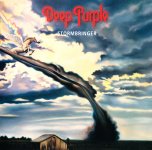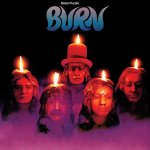In 1974, Deep Purple released their only two albums with the Mark III line up, Burn and Stormbringer. With these records, the group not only replaced vocalist Ian Gillan (who quit) and bassist Roger Glover (who was fired), but also made a stylistic shift towards the popular early seventies style funk rock. Critical response to this new endeavor was mixed (Burn generally received more favorable reviews) while commercial sales remained strong for both albums worldwide.
After Gillan and Glover joined Deep Purple in late 1969, the group's popularity exploded with each of the initial three Mark II? albums Deep Purple In Rock (1970), Fireball (1971), Machine Head (1972) being more popular and better received than the last. An extensive world tour in 1972 resulted in the double-live album, Made in Japan, which went on to become one of rock's highest selling live-concert recordings. The 1973 studio album Who Do We Think We Are was an instant gold record but ultimately is a less than spectacular record overall. Exhausted with the frantic pace, Gillan requested a break, but was pushed by management to complete another tour. The resulting tensions ultimately led to Gillan quitting Deep Purple in the summer of 1973, shortly followed by the dismissal of Glover.
In August 1973, former Trapeze bassist/vocalist Glenn Hughes joined the group, originally intended to take on the duo roles vacated by Gillan and Glover. However, the band came close to bringing in former Free vocalist Paul Rodgers, before he decided to start Bad Company. The idea of remaining a five-piece but with dual lead vocalists persisted and, after several auditions, the group chose David Coverdale, a then-unknown vocalist from Northeast England.
Burn by Deep Purple
Released: February 15, 1974 (Warner Bros.)
Produced by: Deep Purple
Recorded: Rolling Stones Mobile Studio, Montreux, Switzerland, November 1973
Track Listing:
Burn
Might Just Take Your Life
Lay Down, Stay Down
Sail Away
You Fool No One
What's Goin' On Here
Mistreated
200
Stormbringer by Deep Purple
Released: November 1974 (Warner Bros.)
Produced by: Martin Birch & Deep Purple
Recorded: Musicland Studios, Munich, Germany & The Record Plant, Los Angeles, August-September 1974
Track Listing:
Stormbringer
Love Don't Mean a Thing
Holy Man
Hold On
Lady Double Dealer
You Can't Do It Right
High Ball Shooter
The Gypsy
Soldier of Fortune
The self-produced album Burn was recorded in Montreux, Switzerland during November 1973. All members of the group participated in the songwriting but Hughes was not initially given any credits due to past contractual obligations. The title track kicks things off as a hyper-paced mini-epic which frequently returns to the signature riff by Ritchie Blackmore, who later trades off leads with keyboardist Jon Lord. Might Just Take Your Life was the lead single from the album and it starts with Lord's sloshy organ riff before settling into a fine rock groove topped by Coverdale's soulful vocals.
On the upbeat Lay Down, Stay Down Coverdale and Hughes trade off lead vocals resulting in a heavy Doobie-Brothers-like song, while Sail Awa? is a clavichord-driven rocker with contrasting vocals by the two singers and a later psychedelic-type synth by Lord. You Fool No On? features a wild drum and percussion ensemble by Ian Paice before it breaks into a pure classic rocker with some sixties influence.
The album concludes with three songs of very differing styles. The blues rocker What's Goin On Here features thumping rhythms, a generous use of piano by Lord and crisp guitars by Blackmore for an overall effect that should've made this track a hit. Mistreated is an extended, droning song that only really comes to life later with another fine guitar lead. The odd, synth driven instrumental A 200 closes things out with a rhythm making this sort of a more modern adaptation of the Jeff Beck classic Beck's Bolero.
Burn sold over a million copies worldwide and fared well on the charts, hitting the Top 10 in the UK and the US and reaching #1 in several European countries. In April 1974, this lineup of Deep Purple co-headlined the California Jam festival in Ontario, CA, which drew an audience of more than a quarter million and was broadcast on national Television in the US.
Following another world tour, the group returned to the studio in the late summer of 1974 to record Stormbringer. Co-produced by Martin Birch, the album was recorded in both Munich, Germany and Los Angeles and it musically displays Deep Purple even more fully embracing soul and funk elements with Hughes and Coverdale exerting much more influence and Lord providing an exceptionally strong and versatile effort.
The title track Stormbringe? opens the album strongly as a perfect junction where Coverdale's and classic Deep Purple's styles intersect. The song features heavy rhythms, judicious synths, a soaring guitar lead and doomy lyrics to make it a mid-seventies metal classic. The second track, Love Don't Mean a Thing, offers a sharp contrast to the first with duo lead vocals and a cool, bluesy vibe overall. The next two songs are the only not to include Blackmore in composing and they show this stylistically.


After Gillan and Glover joined Deep Purple in late 1969, the group's popularity exploded with each of the initial three Mark II? albums Deep Purple In Rock (1970), Fireball (1971), Machine Head (1972) being more popular and better received than the last. An extensive world tour in 1972 resulted in the double-live album, Made in Japan, which went on to become one of rock's highest selling live-concert recordings. The 1973 studio album Who Do We Think We Are was an instant gold record but ultimately is a less than spectacular record overall. Exhausted with the frantic pace, Gillan requested a break, but was pushed by management to complete another tour. The resulting tensions ultimately led to Gillan quitting Deep Purple in the summer of 1973, shortly followed by the dismissal of Glover.
In August 1973, former Trapeze bassist/vocalist Glenn Hughes joined the group, originally intended to take on the duo roles vacated by Gillan and Glover. However, the band came close to bringing in former Free vocalist Paul Rodgers, before he decided to start Bad Company. The idea of remaining a five-piece but with dual lead vocalists persisted and, after several auditions, the group chose David Coverdale, a then-unknown vocalist from Northeast England.
Burn by Deep Purple
Released: February 15, 1974 (Warner Bros.)
Produced by: Deep Purple
Recorded: Rolling Stones Mobile Studio, Montreux, Switzerland, November 1973
Track Listing:
Burn
Might Just Take Your Life
Lay Down, Stay Down
Sail Away
You Fool No One
What's Goin' On Here
Mistreated
200
Stormbringer by Deep Purple
Released: November 1974 (Warner Bros.)
Produced by: Martin Birch & Deep Purple
Recorded: Musicland Studios, Munich, Germany & The Record Plant, Los Angeles, August-September 1974
Track Listing:
Stormbringer
Love Don't Mean a Thing
Holy Man
Hold On
Lady Double Dealer
You Can't Do It Right
High Ball Shooter
The Gypsy
Soldier of Fortune
The self-produced album Burn was recorded in Montreux, Switzerland during November 1973. All members of the group participated in the songwriting but Hughes was not initially given any credits due to past contractual obligations. The title track kicks things off as a hyper-paced mini-epic which frequently returns to the signature riff by Ritchie Blackmore, who later trades off leads with keyboardist Jon Lord. Might Just Take Your Life was the lead single from the album and it starts with Lord's sloshy organ riff before settling into a fine rock groove topped by Coverdale's soulful vocals.
On the upbeat Lay Down, Stay Down Coverdale and Hughes trade off lead vocals resulting in a heavy Doobie-Brothers-like song, while Sail Awa? is a clavichord-driven rocker with contrasting vocals by the two singers and a later psychedelic-type synth by Lord. You Fool No On? features a wild drum and percussion ensemble by Ian Paice before it breaks into a pure classic rocker with some sixties influence.
The album concludes with three songs of very differing styles. The blues rocker What's Goin On Here features thumping rhythms, a generous use of piano by Lord and crisp guitars by Blackmore for an overall effect that should've made this track a hit. Mistreated is an extended, droning song that only really comes to life later with another fine guitar lead. The odd, synth driven instrumental A 200 closes things out with a rhythm making this sort of a more modern adaptation of the Jeff Beck classic Beck's Bolero.
Burn sold over a million copies worldwide and fared well on the charts, hitting the Top 10 in the UK and the US and reaching #1 in several European countries. In April 1974, this lineup of Deep Purple co-headlined the California Jam festival in Ontario, CA, which drew an audience of more than a quarter million and was broadcast on national Television in the US.
Following another world tour, the group returned to the studio in the late summer of 1974 to record Stormbringer. Co-produced by Martin Birch, the album was recorded in both Munich, Germany and Los Angeles and it musically displays Deep Purple even more fully embracing soul and funk elements with Hughes and Coverdale exerting much more influence and Lord providing an exceptionally strong and versatile effort.
The title track Stormbringe? opens the album strongly as a perfect junction where Coverdale's and classic Deep Purple's styles intersect. The song features heavy rhythms, judicious synths, a soaring guitar lead and doomy lyrics to make it a mid-seventies metal classic. The second track, Love Don't Mean a Thing, offers a sharp contrast to the first with duo lead vocals and a cool, bluesy vibe overall. The next two songs are the only not to include Blackmore in composing and they show this stylistically.

